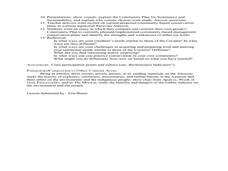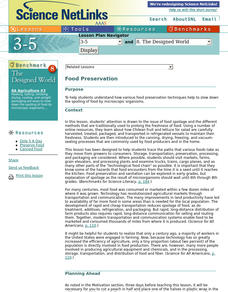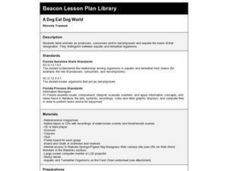Curated OER
Energy Flow in Ecosystems
Middle schoolers, in groups, create a slide show about the ecosystem and answer critical thinking questions based on their research.
Curated OER
Food Webs
Students recognize interdependence in a food web by using yarn and notecards to create a food web and discussing what would happen if one of the organisms from a certain trophic level is removed.
Curated OER
Wetlands - Food Web Relationships
In this food web relationships worksheet, students click on the links to learn about the food web relationships in the wetlands and answer short answer questions about it. Students complete 8 questions total.
Curated OER
Nutrition and Energy Flow
In this energy flow worksheet, students will complete 10 short answer questions based on a food web diagram. Then students will review different cycles in nature including the water cycle, carbon cycle, and energy cycle. This worksheet...
Curated OER
Animals of Madagascar
Students are each assigned an animal from Madagascar. They research their animal and design a picture book about their animal. Students design a cover page, back page, bibliography page and the title page. Their book will contain...
Curated OER
Constructing A Food Web
Students identify and explain the relationships within a food web. They use index cards to glue pictures of producers and consumers. On the back of the card, students name the organism, list the type of biome in which it is found.
Curated OER
Ecosystems - Lessons 1 and 3
In this biology worksheet, students answer 22 multiple choice questions on ecosystem. They identify which ecosystem component is described in each of the question.
Curated OER
Supermarkets, Sustenance and Sustainability
Students investigate jungles and the people who depend upon them. In this sustainability lesson, students research wild life conservation and discover the importance of a jungle to Amazonian people. Students create a group presentation...
Curated OER
Pond Ecosystem Field Trip
Students investigate the environment by participating in a class trip. In this pond ecosystem lesson, students define a list of vocabulary terms associated with ponds such as invertebrate and metamorphosis. Students attend a field trip...
Curated OER
Exploring Ecosystems
Fourth graders create an ecosystem as a class. They have already produced smaller ones. They use a pond or something similar on school grounds to meet the needs of certain plants and animals of their ecosystem. Specifically created will...
Curated OER
Sea Connections
Students, after locating different marine habitats on a globe, play a card game about ecosystems, food webs and organisms.
Curated OER
Home Sweet Home
Students examine the animals that live in trees. They identify their sounds, footprints and droppings. They draw pictures of the animals as well.
Curated OER
The Ant Attack
Third graders observe the daily activity of an ant farm. Through observations and journal writing, they gather data concerning the daily activities of the ants. Students use their observations to predict the effect of environmental...
Curated OER
Fat Fast Foods
Students explore the fast food industry. In this fast food lesson, students research fast food restaurants and the food served. Students create a tri-fold handout to explain the history of fast food and types of food served. Students...
Curated OER
Bacteria
Students study food borne illnesses and what foods are more likely to carry them. In this investigative lesson students examine harmful bacteria.
Curated OER
Sorting
Students explore how books are sorted in a library. In this sorting lesson, students play a game where they have to fill the shelves with books that share a common theme. Students compare this game to a real library. Students discuss how...
Curated OER
A Dog Eat Dog World
Fourth graders distinguish between acquatic and terrestrial organisms. They label animals as producers, consumers, and/or decomposers.
Curated OER
Out of the Deep
Learners observe, describe, and record characteristics of ocean animals (mammals and fish) and sea shells. They conduct an experiment comparing and contrasting sugar water, salt water and fresh water and create a mural of coral reef...
Curated OER
Populations and Ecosystems
Sixth graders define terms prey, predator, and scavenger, describe predator-prey relationship, discuss effects of a lack of predators in an environment, and separate the role of the scavenger from that of the predator.
Curated OER
Forest Food Web
Students explore the elements of a forest ecosystem. They examine the elements needed to form a forest food web. Students construct and describe food webs that include nonliving elements of the ecosystem.
Curated OER
Hide and Seek Science
Pupils examine macro-invertebrates in order to better understand their link to the food web. Working in groups, they record observations of several areas of a stream or river, collect samples from the river bottom, and identify the...
Curated OER
Amphibians
Fourth graders Make flashcards for the following words, memorize them and get quizzed by the teacher: Amphibian, Lungs, complete metamorphosis, tadpoles, tail-less, tail, vertebrate, cold-blooded, gills, swamp, pond.
Curated OER
Paramecium
In this paramecium worksheet, students sharpen their science skills as they color the parts of a paramecium according to the instructions and then respond to 15 analysis questions.
Curated OER
Podcasting Crusader's Style
Students work as a group of scientists studying a specific biome of their choice. In this biome lesson, students research a biome and develop a podcast where factual information is read about a biome and the events of interest that make...
Other popular searches
- Desert Food Chain
- Animal Food Chain
- Deciduous Forest Food Chains
- Pond Food Chain
- Ocean Food Chain
- Frog Food Chain
- Food Chains in Biomes
- Arctic Food Chain
- Desert Animal Food Chain
- Ocean Animals Food Chain
- Coral Reef Food Chain
- Marine Science Food Chain

























